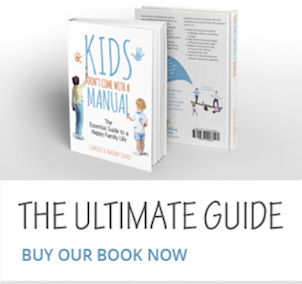We are under no illusions about the reality of family life and the fact is there is no magic wand to make a family life perfect! However, with a bit more awareness of our needs as well as that of our children’s, we can go a long way to making a real difference to our children’s, our family’s and our own lives. So with this in mind, we thought we’d give you our top tips to help you become a happier parent, and make parenting a more enjoyable and rewarding experience.
- Stop striving to be perfect
While we all want to do our best as parents, we should be careful of striving to be perfect as this can actually cause more problems than it solves. Remember, there is no such thing as a ‘perfect parent’, so striving for perfection makes parents feel as if they are constantly failing and often feeling guilty for it. Give yourself a break and accept that there are going to be times when you make mistakes, and that actually this is okay because mistakes help us to become stronger and more resilient in the long-term.
- Allow mistakes and forgive
Don’t give yourself or your children a ‘hard time’ when you or they make a mistake. Rather than viewing a mistake as a failure, try looking at it as an opportunity to learn from the experience and grow as a person. Teach your children to learn from their mistakes by not using “I told you so”! The most important thing is that you lean to forgive yourself and your children when mistakes are made – remember that nobody is perfect (including ourselves) and nor should we expect them to be!
See tool Mistakes as Opportunities for Learning in our book Kids Don’t Come With a Manual
- Focus on what you can control
It’s only natural that we should want to have as much control over our own lives as possible, as well as that of our children’s. The problem is that we often try to control something we have little control over, and this usually ends up in a power struggle. For example, we cannot ‘control’ if our child tidies their room. However, what we do ‘control’ is if our child can go to their friend’s house (or whatever they’d like to do next) so you can say instead: “I’m happy to take you to your friend’s house as soon as you’ve tidied your room”. The sooner we stop worrying about things that we cannot change and start focusing on the things that we do control, the happier we become.
See tool “I” Statements in our book Kids Don’t Come With a Manual
- Be more strategic by planning ahead
If we plan better how we’re going to deal with challenges that children decide to throw our way, our response is likely to be a lot more effective than if we respond ‘reactively’ to their behaviour. Dealing with everyday parenting challenges without confrontation or anger helps to prevent them from spiralling out of control, and makes for a happier parent and happier household.
See tool Planning Ahead and Creating Routines in our book Kids Don’t Come With a Manual
- Look after yourself
Self-care is an essential part of not only being a happy parent, but also being a more effective one. We can sometimes become so consumed in our role as ‘parent’ that we forget to attend to ourselves and our own needs. However, the way we treat ourselves sends a message to our children about how they should behave in their own lives. So it’s essential that you schedule in some all-important ‘me-time’ on as regular a basis as possible. Even if you just take ten minutes out to do a crossword or find twenty minutes for a nice hot bubble bath. Taking time out to relax helps to recharge your energy and clears the mind, which in turn will also help you to parent more effectively.
After all, a happy parent is far more likely to raise happy children!
See tool Taking Good Care of Yourself in our book Kids Don’t Come With a Manual
- Focus on the ‘here and now’
Many parents struggle to really ‘be in the moment’ and enjoy the time they spend with their children because they’re too busy worrying about something that’s happened in the past, or what might happen in the future. One of the best ways to focus on the present and enjoy the moment is to spend some ‘special’ one-on-one time with your children. This not only brings the greatest joy, but it can also reduce your children’s ‘mis’behaviour as they get some of their essential needs meet (the need for belonging and significance).
See tool One-on-one Time in our book Kids Don’t Come With a Manual
- Remember that you have a sense of humour!
This is one of the most important pieces of advice for any parent because the challenges our children ‘throw at us’ every day can easily make us lose our sense of humour. Remember that fun and laughter is a sure fire way of strengthening the bond of the family unit and to instil joy in our children. If we allow ourselves to laugh with our children and endeavour to look at the lighter side of life, the parenting journey becomes much more fun and we get to enjoy our children a whole lot more as a result.
See tool Humour and Joy in our book Kids Don’t Come With a Manual
- Play and have fun with your child(ren)
Channel your inner child and enjoy some good old-fashioned playtime with your children. Allow them to lead you in the games they want to play because this gives you the opportunity to get to know your child better and build a stronger connection, and they get the satisfaction of knowing that they’re in the ‘driving seat’ during your playtime together. After all, a family who plays together stays together!
See tool Playing in our book Kids Don’t Come With a Manual
- Remember that you have the choice to react differently
We are all human and despite our best intentions, there will be moments where we get triggered and ‘lose it’. Unfortunately, what we often don’t realise is that raising our voice is likely to put our children in ‘fight or flight’ mode and they won’t be able to process what we are telling them anymore, which means it’s more difficult to get them to understand what we’re asking from them. In these circumstances, remember that you have a choice to stop yourself before it’s too late (i.e. before you lose the connection with your child and they can’t hear you anymore). A great tool is to say “Rewind” loudly, then pause, take a deep breath and take the situation back to where you went off course. This is a great way of stopping any ‘damage’ from happening to the relationship, and modelling to our children that it’s possible to control ourselves even when we’re angry.
See tool Rewind and Replay in our book Kids Don’t Come With a Manual
- Don’t be afraid to ask for help
Asking for help doesn’t make you a bad parent – in fact, quite the opposite is true. We all have moments when we feel ‘we’re in over our heads’, and sharing with others is usually reassuring as it makes us realise that we are all facing similar challenges. As you will certainly receive conflicting advice (we’ve all been there!), keep in mind that people are just trying to help so take the advice that you can use and simply ignore the – well meaning – advice that really won’t work for you ;-).
If you would like practical and effective tools that will make parenting more enjoyable and rewarding, check out our book Kids Don’t Come With a Manual – The Essential Guide to a Happy Family Life.













































